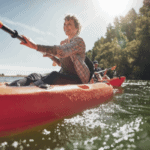Four Vital Things to Know While Having Fun in the Sun
July 30, 2015
By: Sarah Clarke, MS, RD, CES
Fitness Specialist and Dietitian at Emerald Heights
Summer is upon us and you know what that means—boat rides, flip flops and outdoor barbeques. But before we grab our beach bags, we all need to be aware of the harmful effects that come with the season of fun, no matter our age. Elderly people do not adjust to sudden changes in temperature as young people can. In addition, those with chronic medical conditions respond differently to heat than others do.
Keep in mind these four things as you pack for an outdoor picnic or take a stroll around the block.
- The sun is our no. 1 “frenemy”. Many health risks come with rays of sunshine. Take necessary precautions by staying in the shade, especially during the hours of 9 a.m. and 3 p.m. when the sun’s ultraviolet rays (UV) are their strongest. In addition, wearing a hat that covers thin-skinned areas including your face, ears and back of the neck will keep your skin looking vibrant and healthy.
- Reapply, reapply, and reapply. Our mothers were right after all of these years; sunscreen helps prevent damaged skin and reduces our risk of developing skin cancer. When shopping for a sunscreen, look for the label “broad spectrum.” Broad spectrum lotions protect against both long UVA waves and short UVB rays.Now the question is which sun protection factor (SPF) is the best? For minimal daily sun exposure SPF 15 lotions are sufficient, however if an afternoon of hiking or boating is on the books opt for a higher SPF (30 or greater) and water resistant lotion. Don’t forget that in addition to applying sunscreen on your body, your eyes are also susceptible to being sunburned. Wear your favorite pair of shades to protect your eyes from UV rays.
- Hydration is key. Regardless of the outside temperature the average male should consume 12 cups of water a day and the average female should consume 9 cups of water a day. According to the Academy of Nutrition and Dietetics, for every half an hour spent in the sun or breaking a sweat, an additional cup of water should be added to your daily intake. Water should be sipped throughout the day, not consumed all at once. Seniors that take more prescription medications should also consume more water, because taking medications can increase perspiration.
- Dehydration is dangerous. Everyone should be aware of the signs of dehydration to help fellow hikers and those in the group. Symptoms of mild-to-moderate dehydration include dark colored urine, thirst, sleepiness, dry mouth, dry skin, lightheadedness and headaches.
Severe dehydration includes extreme thirst, low blood pressure, rapid heart rate, rapid breathing, fever and delirium. If you or someone you see is experiencing these signs seek medical help immediately or call 9-1-1.
Getting fresh air and exercise has many health benefits, but at the same time we must be wary of the added stress hot weather can put on our bodies.



